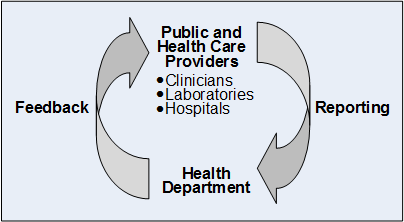To understand the prevalence, distribution, and causes of disease in a population, epidemiological surveys are essential. They offer important information on the prevalence of diseases and aid in locating the most at-risk groups that need specialised care. In this article, we’ll go into the idea of epidemiological surveys and examine how they might be used to focus therapy on the people that deserve it the most.
The value of individualised care
It is impossible to exaggerate the value of tailored treatment in the healthcare system of today. It is crucial to make sure that treatments are focused on the people who are most lacking due to a lack of money and rising healthcare prices. This reduces wasteful expenditures on health care while also maximising the beneficial effect of interventions.

The most vulnerable individuals or populations for a given disease or condition can be found through epidemiological surveys. Healthcare professionals can create interventions that precisely target the patients who need them the most by being conscious of the risk elements, travellers, and sequences of illness distribution.
Epidemiological Survey Interactive Analysis
Cross-sectional, cohort, case-control, and experimental studies are only a few of the study types used in epidemiological surveys. Data on demographic traits, health behaviours, environmental exposures, and health outcomes are gathered from a representative sample of the population being studied for these surveys.
To find trends and connections connecting risk factors as well as medical methodical techniques are used to analyse the data collected via epidemiological research. Regression analysis, multivariate analysis, and machine learning are examples of sophisticated analytical methods that are used to investigate complex relationships between variables and discover potential confounding variables.
Epidemiological survey results are frequently shown in the form of tables, graphs, and charts, which provide the data as a graphical representation. These visualisations make it easier to comprehend complex data and make the results more understandable to a wider audience.
Key Results from Epidemiological Studies
Epidemiological studies have produced several notable results that have profound ramifications for targeted therapy. Among the main conclusions are:

- Populations that are at a higher risk: of having certain diseases have been identified according to epidemiological surveys. Surveys have revealed, for instance, that those with a family history of diabetes are more likely to develop the disease themselves. For these populations that are at risk particular therapies can be made, such as programme screenings and changes in habits.
- Understanding risk factors: Epidemiological studies have given us important information on the risk factors connected to different diseases. According to polls, smoking, for instance, significantly increases the risk of coronary artery bypass surgery and cancers of the lungs. This information can be used to create treatments that focus on these risk factors, such as wellness initiatives and nicotine replacement clinics.
- Epidemiological studies: can be used to evaluate the efficacy of therapies in actual clinical settings. Surveys, for instance, can compare the outcomes of patients who received a specific treatment with those of those who skipped it receive it to assess the treatment’s influence on health outcomes. Therapies can be improved and patient outcomes can be raised by using this information.
- Monitoring disease trends: Epidemiological surveys can help monitor the trends in disease prevalence and distribution over time. For example, surveys can track the changes in the prevalence of chronic diseases such as diabetes or hypertension, in different age groups or geographical regions. This information can aid in identifying emerging health trends and developing targeted interventions to address them.
- Detecting health disparities: Epidemiological studies have shown that there are health discrepancies between various populations. For instance, studies have revealed that certain minority groups may experience a greater incidence of specific diseases than the overall population. By identifying and treating health disparities and creating interventions that are catered to the particular requirements of these communities, this knowledge can be helpful.
Challenges and Limitations
While epidemiological surveys are invaluable in targeting treatment, they also face certain challenges and limitations. Some of these include:

- A sample bias: To obtain information from an adequate representation of the population for epidemiological surveys, sampling procedures are used. However, sampling bias can happen if the sample is not accurately representative of the overall population, which could result in inaccurate conclusions.
- Recall bias: Epidemiological surveys often rely on self-reported data, which can be subject to recall bias. Participants may not accurately remember or report their health behaviours or exposures, leading to potential misclassification of variables.
- Confounding variables: It’s possible that some contributing factors aren’t constantly correctly taken into in epidemiology surveys, which might impact the validity of the results. Confounding variables can obfuscate the real connection that exists between becoming aware and the result you want by being linked to both.
- Limitations of study designs: Different study designs used in epidemiological surveys have their limitations. For example, cross-sectional studies can only provide a snapshot of the population at a single point in time, while cohort studies require long-term follow-up, which can be resource-intensive.
- Ethical considerations: Epidemiological surveys involving human subjects must adhere to ethical guidelines, such as obtaining informed consent, protecting privacy and confidentiality, and ensuring equity in participant recruitment. However, these ethical considerations may pose challenges in conducting surveys and obtaining accurate data.
Efficacious Treatment Targeting Techniques
Numerous ways can be put into practice to successfully target treatment to individuals who need it the most utilising the outcome of surveys involving epidemiology Some of these tactics consist of:

- Using risk stratification tools: including in the Scores for risk or the forecasting examples, finding groups at risk can help focus treatment on people who are most at risk of contracting a given disease. A diabetes risk score, for instance, can be used to identify those who have a higher chance of getting the disease and to target interventions like lifestyle changes or medication use accordingly.
- Personalised medicine: Utilizing advances in genomics and personalized medicine can help tailor treatments based on an individual’s genetic profile and other personalized factors. This approach can improve treatment effectiveness and minimize unnecessary interventions for individuals who may not benefit from certain treatments.
- Health promotion and prevention: Based on the risk variables discovered by epidemiological surveys, health promotion and prevention plans can be created to focus on the modifiable risk factors connected to a certain disease. For instance, conducting public health programmes to encourage good lifestyle practises like regular physical activity, a nutritious diet, and quitting smoking might help prevent or delay the onset of chronic diseases.
- Screening and early detection: Epidemiological surveys can inform the development of screening programs to detect diseases at an early stage when treatment is most effective. For example, based on the findings of surveys, screening programs can be implemented to detect cancers or other diseases in high-risk populations, leading to early detection and timely interventions.
- Remedies within the social groups: epidemiological studies can help with establishing community-based therapies that are appropriate for the particular requirements of the population. To encourage healthy habits, offer knowledge, and increase access to medical services, these actions can be put to their location at the neighbourhood level in areas like local schools, workplaces, or neighbourhoods.

Conclusion
Finally, epidemiological analyses are crucial in directing treatment treatments to those who require them the most. Epidemiological surveys can contribute to effective and targeted treatment interventions that can improve health outcomes and reduce the burden of sickness in populations by identifying populations at risk, letting policies regarding health and resource allocation, promoting health equity, and utilising innovative strategies.
However, it is critical to recognise and address the problems and limitations of epidemiological surveys to ensure the validity and reliability of the findings, as well as continually monitor and evaluate interventions for their effectiveness.
FAQs (Frequently Asked Questions)
Q1: What are the key components of an epidemiological survey?
A: The key components of an epidemiological survey typically include study design, sample selection, data collection methods, data analysis, and interpretation of results.
Q2: How are epidemiological surveys used in targeting treatment interventions?
A: Epidemiological surveys provide valuable data on disease burden, risk factors, and determinants of health, which can inform the development of targeted treatment interventions for specific populations or regions.
Q3: What are some challenges in conducting epidemiological surveys?
A: Challenges in conducting epidemiological surveys can include issues related to study design, sample selection, data quality and reliability, ethical considerations, and resource constraints.
Q4: How can health equity considerations be incorporated in targeting treatment interventions?
A: Health equity considerations can be incorporated in targeting treatment interventions by addressing social determinants of health, reducing health disparities, and promoting equitable access to healthcare services.
Q5: Why is continuous monitoring and evaluation important in targeted treatment interventions?
A: Continuous monitoring and evaluation of targeted treatment interventions are important to assess their effectiveness, identify any gaps or challenges, and make necessary adjustments to improve health outcomes.































